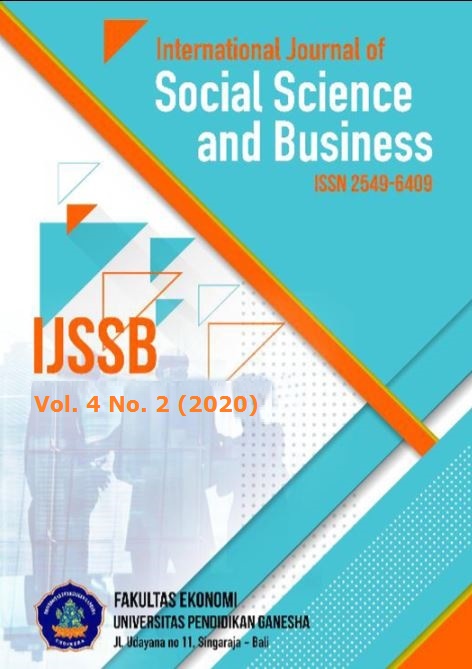The Influence of Social Media Addiction to Employees Performance with Cyberloafing as Intervening Variable (Study on Generation Y Workers at MNC)
DOI:
https://doi.org/10.23887/ijssb.v4i2.24210Keywords:
Social Media Addiction, Cyberloafing, Employees PerformanceAbstract
The use of internet especially social media was inevitable in today’s society. Using the internet effectively and in moderation can become a useful to get the job done efficiently. Inappropriate use of internet or social media can lead to lower performance, particularly if it had become an addiction. The purpose of this research was to test whether social media addiction influence performance with cyber loafing as intervening variable. This was a quantitative research with sample of 110 generation Y workers at MNC in Jakarta. The analysis technique used is path analysis. The result of this research showed that social media addiction is low, with moderate cyberloafing and high performance. The path analysis indicated that social media addiction positively influence cyberloafing, but social media addiction and cyberloafing did not influence employees’ performance. Therefore, Cyberloafing did not act as intervening variable. Different companies have different policies concerning the use of internet. Some company have a strict rule and demands their employees to be professional in a way to did not use their Mobile phone to access their social media or not to cater to their personal need during their working hours. Professionalism is needed by employees to survive in their job. The company demand to be as professional as employees can make them did not addict to their social media. So causes the result of this study that said there is no influence between cyberloafing a social media addiction toward employees’ performance.
References
Andreassen, C. S., Torsheim, T., & Pallesen, S. (2014). Use Of Online Social Network Sites For Personal Purposes At Work: Does It Impair Self-Reported Performance? 1 . Comprehensive Psychology, 3(1), Article 18. Https://Doi.Org/10.2466/01.21.Cp.3.18
Arif Marsal, F. H. (2018). Pengaruh Penggunaan Media Sosial Terhadap Kinerja Pegawai Di Lingkungan Uin Suska Riau. Jurnal Ilmiah Rekayasa Dan Manajemen Sistem Informasi, 4(1), 91–98.
Basri, A. S. H. (2014). Kecenderungan Internet Addiction Disorder Mahasiswa Fakultas Dakwah Dan Komunikasi Ditinjau Dari Religiositas. Jurnal Dakwah, XV(2), 407–432.
Bencsik, A., Juhász, T., & Horváth-Csikós, G. (2016). Y And Z Generations At Workplaces. Journal Of Competitiveness, 6(3), 90–106. Https://Doi.Org/10.7441/Joc.2016.03.06
Byun, S., Ph, D., Ruffini, C., Sc, B., Mills, J. E., Ph, D., … Ph, D. (2009). Quantitative Research. 12(2). Https://Doi.Org/10.1089/Cpb.2008.0102
Davidson, M. (2011). Electronic Media & Politics June 2011 CIVIC EDUCATION AND SOCIAL MEDIA USE. Electronic Media, 1(June), 1–28.
Diurna, A. (2013). Journal “Acta Diurna”. Vol.I. No.I. Th. 2013. (I), 1–24.
Ghoshal, S., & Bartlett, C. A. (1990). The Multinational Corporation As An Interorganizational Network. Academy Of Management Review, 15(4), 603–626. Https://Doi.Org/10.5465/Amr.1990.4310825
Huang, H., & Leung, L. (2009). Instant Messaging Addiction Among Teenagers In China: Shyness, Alienation, And Academic Performance Decrement. Cyberpsychology And Behavior, 12(6), 675–679. Https://Doi.Org/10.1089/Cpb.2009.0060
Kaplan, A. M., & Haenlein, M. (2010). Users Of The World, Unite! The Challenges And Opportunities Of Social Media. Business Horizons, 53(1), 59–68. Https://Doi.Org/10.1016/J.Bushor.2009.09.003
Kilber, J., Barclay, A., & Ohmer, D. (2020). Seven Tips For Managing Generation Y. 15(2012), 80–91.
Koay, K. Y., & Soh, P. C. H. (2018). Should Cyberloafing Be Allowed In The Workplace? Human Resource Management International Digest, 26(7), 4–6. Https://Doi.Org/10.1108/HRMID-05-2018-0107
Mellyna Eka Yan Fitri, Prima Yulianti, I. A. (2008). Advanced Research Project Agency Network ). Menara Ekonomi, IV(1), 88–100.
Panjaitan, P., & Prasetya, A. (2017). PENGARUH SOCIAL MEDIA TERHADAP Produktivitas Kerja Generasi Millenial ( Studi Pada Karyawan PT . Angkasa Pura I Cabang Bandara Internasional Juanda ). Jurnal Administrasi Bisnis (JAB), 48(1), 173–180. Retrieved From Http://Administrasibisnis.Studentjournal.Ub.Ac.Id/Index.Php/Jab/Article/View/1884
Rodway, C., Norrington-Moore, V., While, D., Hunt, I. M., Flynn, S., Swinson, N., … Shaw, J. (2011). A Population-Based Study Of Juvenile Perpetrators Of Homicide In England And Wales. Journal Of Adolescence, 34(1), 19–28. Https://Doi.Org/10.1016/J.Adolescence.2010.03.005
Seemiller, C., & Grace, M. (2017). Generation Z: Educating And Engaging The Next Generation Of Students. About Campus, 22(3), 21–26. Https://Doi.Org/10.1002/Abc.21293
Sherlyanita, A. K., & Rakhmawati, N. A. (2016). Pengaruh Dan Pola Aktivitas Penggunaan Internet Serta Media Sosial Pada Siswa SMPN 52 Surabaya. Journal Of Information Systems Engineering And Business Intelligence, 2(1), 17. Https://Doi.Org/10.20473/Jisebi.2.1.17-22
Sholichah, A. S. (2018). Jurnal Edukasi Islami Jurnal Pendidikan Islam Vol . 07 / No . 1 , Teori-Teori Pendidikan … Teori-Teori Pendidikan …. 7(1). Https://Doi.Org/10.30868/EI.V7
Young, B. K. S. (2001). Employee Internet Management 1. Young, 1–37.











